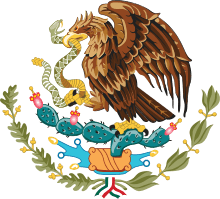Spanish/Lessons/¿Qué hora es?
< Spanish < Lessons
Dialogue
- Raúl: ¡Hola Sofía! ¿Qué hora es?
- Sofía: Son las ocho y cuarto.
| Vocabulary | |
|---|---|
| Luego | Then, after |
| Salgo | I leave |
- Raúl: Gracias. ¿Qué haces normalmente por la mañana?
- Sofía: Me levanto a las siete. Luego, me ducho y desayuno. Normalmente salgo a las ocho.
- Raúl: Ah, vale. Entonces, ¿cuándo almuerzas?
- Sofía: Suelo almorzar a la una.
- Raúl: Claro. ¡Adiós!
- Sofía: ¡Hasta luego!
Translation (wait until the end of the lesson).
Telling the time
Telling the time is easy in Spanish, and very similar to English. You use this construction:
So, Son las tres y veinte would mean "It's twenty past three". To ask the time, you just use the question ¿Qué hora es? (literally: "What hour is it?"). However, this only works for times up to half-past the hour. How do you say "It's twenty to three", I hear you cry? For this, you have to use menos (meaning "less") instead of y (Son las cuatro menos diez means "It's ten to four"; you can also use para instead menos, using the same order you use in English.
Other typical time-telling phrases are depicted in the table below.
|
Spanish Vocabulary • ¿Qué hora es?
| |
|---|---|
| Inglés | Español |
| a.m. | de la mañana |
| p.m. | de la tarde |
| It's half-past [hour] | Son las [hour] y media |
| It's quarter-past [hour] | Son las [hour] y cuarto |
| It's quarter-to [hour] | Son las [hour] menos cuarto/es un cuarto para las [hour] |
- Notes
- If there aren't any minutes, just say son las cinco ("It's 5 o'clock") or son las once ("It's 11 o'clock"). If you want, you can also say en punto to mean "o'clock".
- Remember: son means "they are", so son las... only works for numbers greater than one. To say "it's one o'clock", you have to say Es la una (or es la una en punto).
- Examples
- Son las ocho
- It's 8 o'clock
- Son las nueve y media
- It's half-past nine
- Son las seis menos cuarto/es un cuarto para las seis
- It's quarter-to six
- Son las dos y veinte de la mañana
- It's 2:20 a.m.
When?
So, you now know how to tell the time in Spanish. Now let's use it to describe when something happens. To do this, you use a las followed by the time as described above (a las tres means "at 3 o'clock"). But what if you don't know a specific time? What about just "In the evening"? Just use por la, followed by one of the entries in the table (por la noche means "at night"):
|
Spanish Vocabulary • ¿Qué hora es?
| |
|---|---|
| Inglés | Español |
| Morning | Mañana |
| Afternoon | Tarde |
| Evening | Noche |
| Night | |
- Notes
- Since these times-of-day are all feminine, "por la" is the prepositional phrase used with them.
- Examples
- A las ocho de la mañana, tomo mi desayuno.
- At 8:00am, I eat breakfast.
- Por la tarde, le gusta ver la tele.
- In the evening, He likes watching TV.
- Por la noche, les gusta mucho beber leche.
- At night, they love drinking milk.
Time-related Adverbs
It's all very well knowing how to say that you do things at a particular time, but what about more habitual actions? What do you do usually? Normally? Sometimes?
|
Spanish Vocabulary • ¿Qué hora es?
| |
|---|---|
| Inglés | Español |
| Usually | Normalmente |
| Often | A menudo |
| Sometimes | A veces |
| Occasionally | De vez en cuando |
| Ocasionalmente | |
| Rarely | Raramente |
| To use to | Soler |
- Notes
- You should notice that all the words ending in "ly" in English end in mente in Spanish. To turn an adjective into an adverb: take the feminine form of the adjective, then add mente.
- Thus, normal, raro, ocasional and usual are all adjectives.
- Also, ruidosamente, tranquilamente, etc, are adverbs (you met tranquilo and ruidoso in lesson 4...)
- Soler is a UE stem-changing verb (suelo, sueles, suele, solemos, soléis, suelen), and it is followed by the infinitive (Suelo comer queso con pan, meaning "I usually eat cheese with bread").
- Examples
- A veces bebemos vino tinto, pero nunca vino blanco.
- Sometimes, we drink red wine, but never white wine.
- Suelo vivir en pisos; vivir en una casa es muy difícil.
- I usually live in flats; living in a house is really difficult.
- De vez en cuando juego al ajedrez, pero normalmente practico judo.
- Sometimes I play chess, but usually I do judo.
Reflexive verbs
Reflexive verbs are verbs where the subject and object are the same. "To wash oneself" or "to get oneself up". In Spanish, we do this by using a reflexive pronoun before the verb. We've already met these relfexive pronouns, along with a reflexive verb in the first lesson: llamarse ("to call oneself"). So, here are the reflexive pronouns:
|
Spanish Vocabulary • ¿Qué hora es?
| |
|---|---|
| Inglés | Español |
| Myself | Me |
| Yourself | Te |
| Himself/Herself/Itself | Se |
| Ourselves | Nos |
| Yourselves | Os |
| Themselves | Se |
So, here is an example, using the verb lavarse ("to wash oneself"):
|
Spanish Verb • ¿Qué hora es?
| |
|---|---|
| Inglés | Español |
| I wash myself | Me lavo |
| You wash yourself | Te lavas |
| He/she/it washes himself/herself/itself | Se lava |
| We wash ourselves | Nos lavamos |
| You wash yourselves | Os laváis |
| They wash themselves | Se lavan |
So, now that you know how to conjugate them, it'd be useful to give you some examples:
|
Spanish Vocabulary • ¿Qué hora es?
| |
|---|---|
| Inglés | Español |
| To get (oneself) up | Levantarse |
| To shower (oneself) | Ducharse |
| To bathe (oneself) | Bañarse |
| To comb one's hair | Peinarse |
| To put one's make-up on | Maquillarse |
| To relax (oneself) | Relajarse |
- Notes
- These are very similar to the indirect object pronouns used with gustar. Make sure you don't get them mixed up.
- When in the infinitive, the reflexive pronoun goes on the end of the verb as a suffix. For example, me gusta ducharme means "I like showering".
- Examples
- Por la mañana, me maquillo y me peino.
- In the morning, I put my make-up on and comb my hair.
- ¿Cuándo te bañas?
- When do you bathe?
- A las ocho de la mañana, nos levantamos.
- At 8am, we get up.
- Nunca nos bañamos por la mañana; nos gusta ducharnos.
- We never have a bath in the morning; we like to have a shower.
- Me encanta bañarme por la noche - es muy tranquilo.
- I love having a bath in the evening - it's very quiet.
- A veces se ducha por la mañana, pero normalmente le gusta bañarse por la tarde.
- Sometimes, he has a shower in the morning, but usually he likes to have a bath in the afternoon.
- A las nueve de la tarde me gusta relajarme. Normalmente bebo vino.
- At 9pm I like to relax. Usually, I drink wine.
Summary
In this lesson, you have learnt
- How to ask for the time (¿Qué hora es?)
- How to tell the time (Son las cuatro y media; es la una menos cuarto)
- How to say the times of the day (por la mañana; tarde; a las tres y diez)
- Various adverbs (ocasionalmente; normalmente; de vez en cuando; a menudo)
- How to use reflexive verbs (me baño; te relajas; se ducha; nos lavamos; os lavantáis; se maquillan)
You should now do the exercise related to each section (found here), and translate the dialogue at the top before moving on to lesson 8...
.svg.png) |
¡Aprovéchalo! |
 |